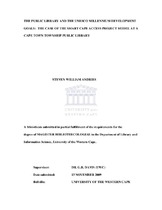The public library and the UNESCO millennium development goals: the case of the Smart Cape access project model at a Cape Town township public library
Abstract
This research explored how the Smart Cape Access Project in Delft Public Library is used by the Delft community and how it related to the Millennium Development Goals asset out by the United Nations Educational, Scientific and Cultural Organisation (UNESCO). This study also investigated the Smart Cape Access Project, as an initiative by the City of Cape Town to ensure access to Information Communication Technologies (ICTs) for all citizens of Cape Town, and how it is utilised as a tool for economic and personal development. The research took place at Delft Public Library in Delft. Delft is a residential area with no industries, whatsoever. The area has a high unemployment rate, high crime rate and more than 60% of those employed earn less than R1600. 00 per month. These factors and the fact that the City of Cape Town recognizes the importance of ICTs for economic and social growth made Delft ideal for this research. The study also investigated whether the information given via the Smart Cape Access project is relevant for sustainable development. Sustainable development is on the agenda of many countries and the concept can be taken as far back as the seventies with the first United Nations Conference on the Human Environment in Stockholm, Sweden and culminating in the World Summit on Sustainable Development in 2002 in Johannesburg, South Africa. In South Africa several initiatives were implemented to bring ICTs to those who do not have access to ICTs, as the importance of ICTs to improve and uplift the quality of life
are recognised by different role-players e.g. government, private sectors and nongovernmental organisations (NGOs). The researcher regarded this as sufficient reason to embark on this study, though the scope of the study only concentrated on the Smart Cape Access Project in one public library.

